人教版高中英语必修4 Unit 4 Body language 全单元课件(90张ppt)
文档属性
| 名称 | 人教版高中英语必修4 Unit 4 Body language 全单元课件(90张ppt) | 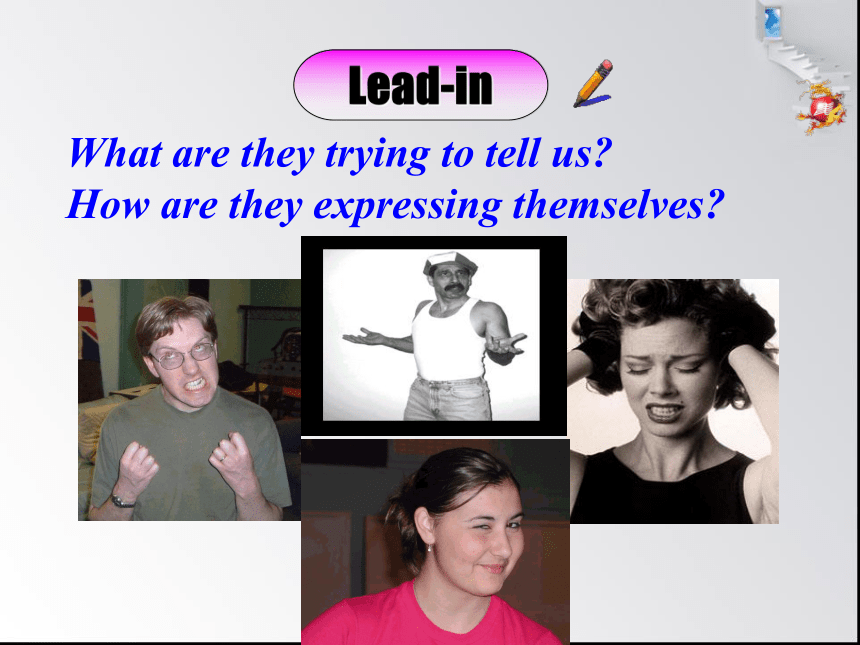 | |
| 格式 | zip | ||
| 文件大小 | 3.2MB | ||
| 资源类型 | 教案 | ||
| 版本资源 | 人教版(新课程标准) | ||
| 科目 | 英语 | ||
| 更新时间 | 2020-04-17 22:43:47 | ||
图片预览

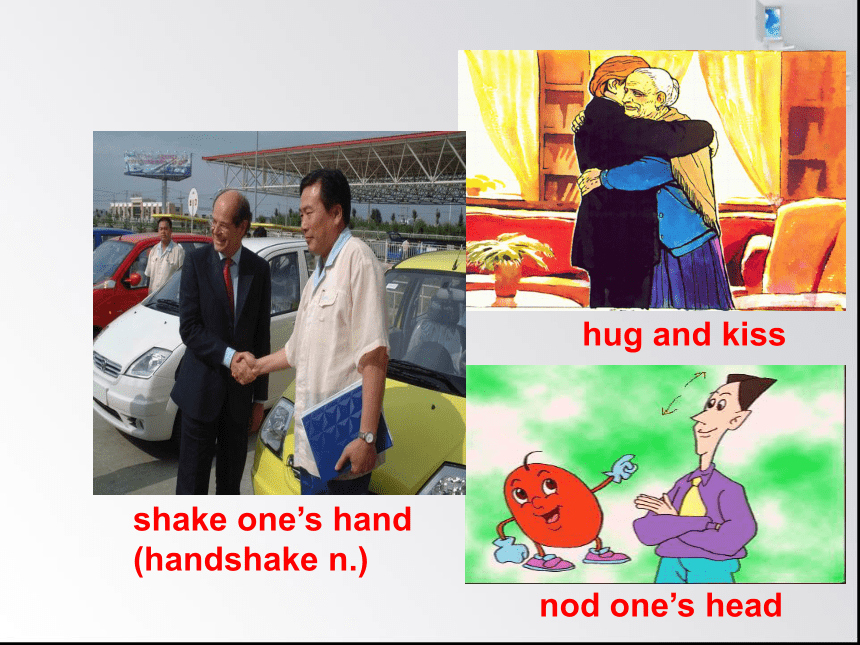
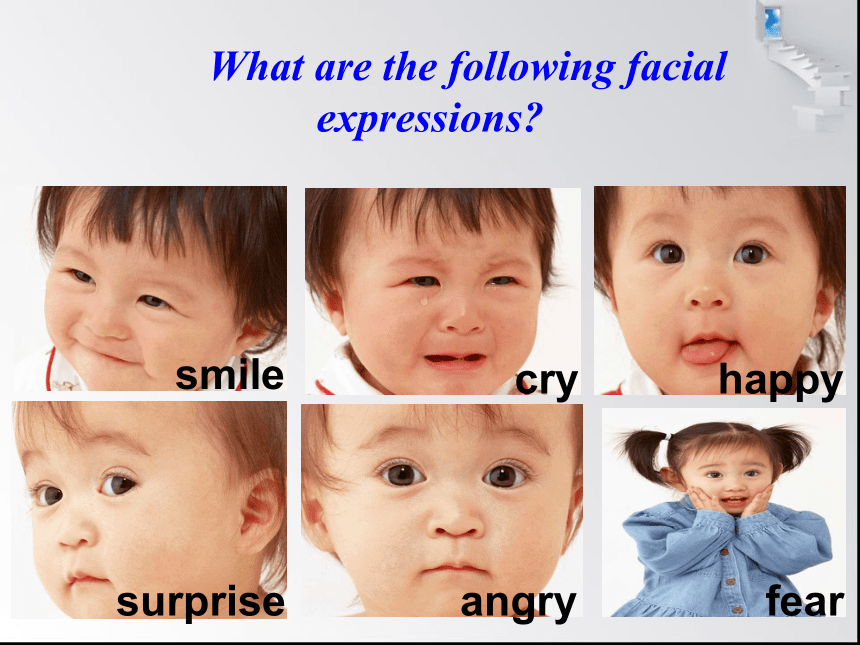
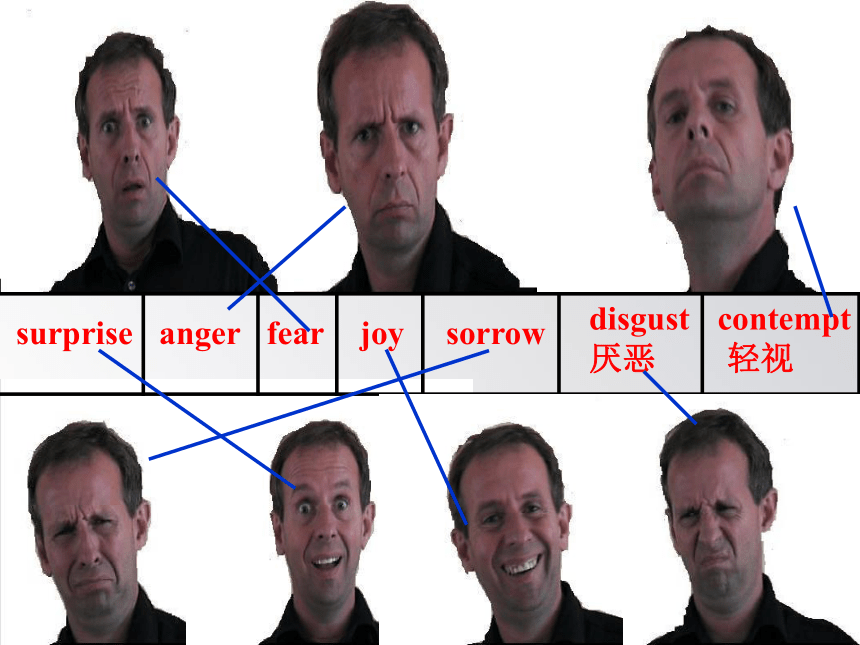


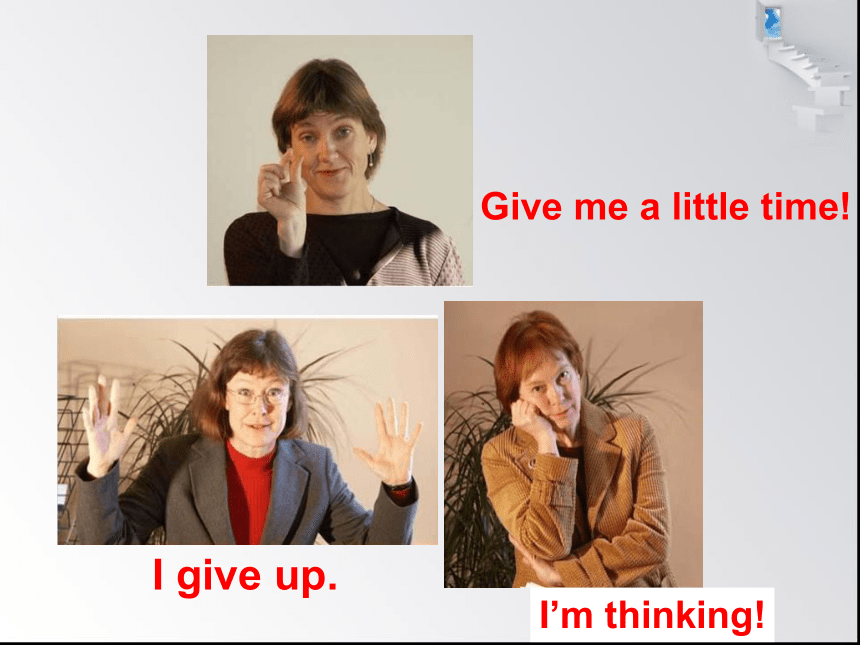
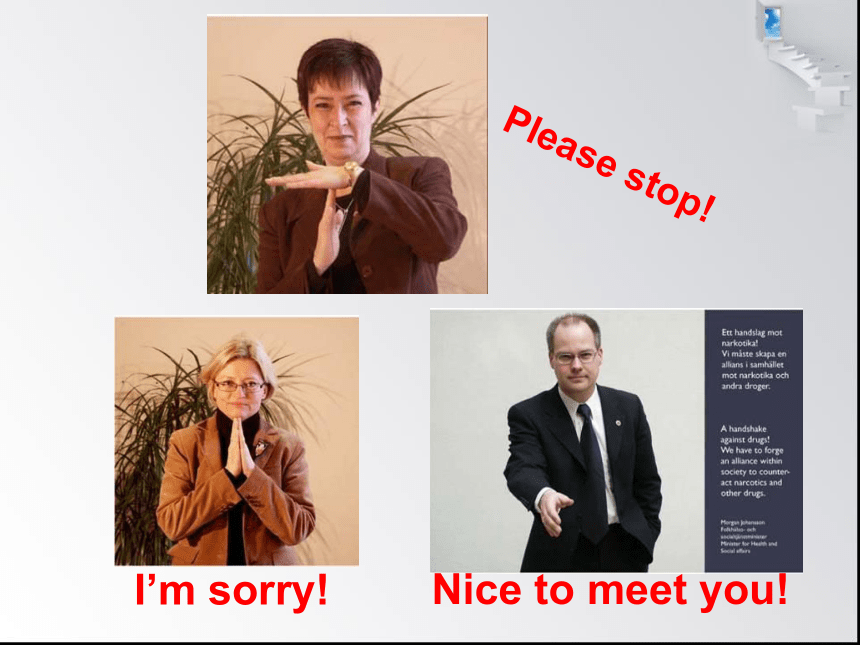

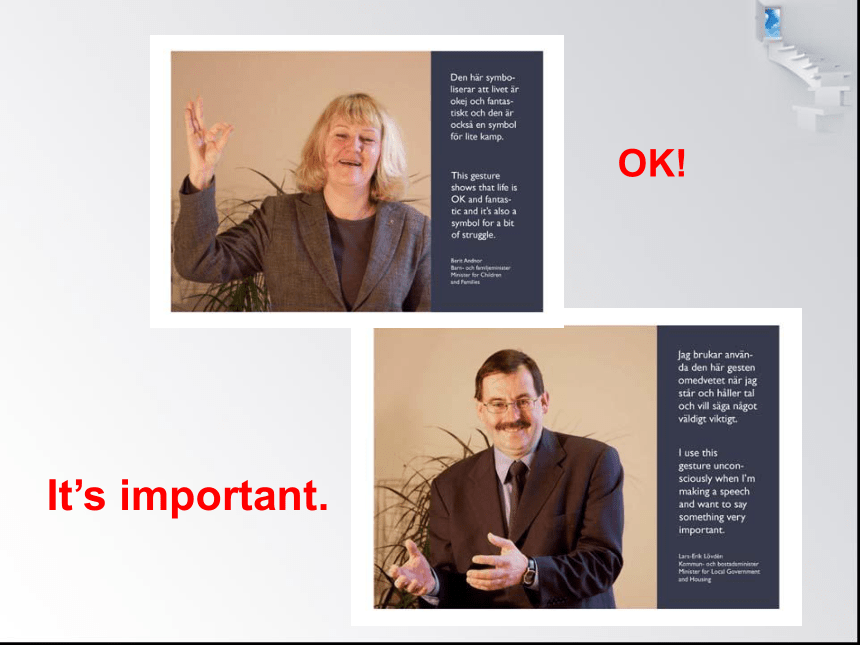
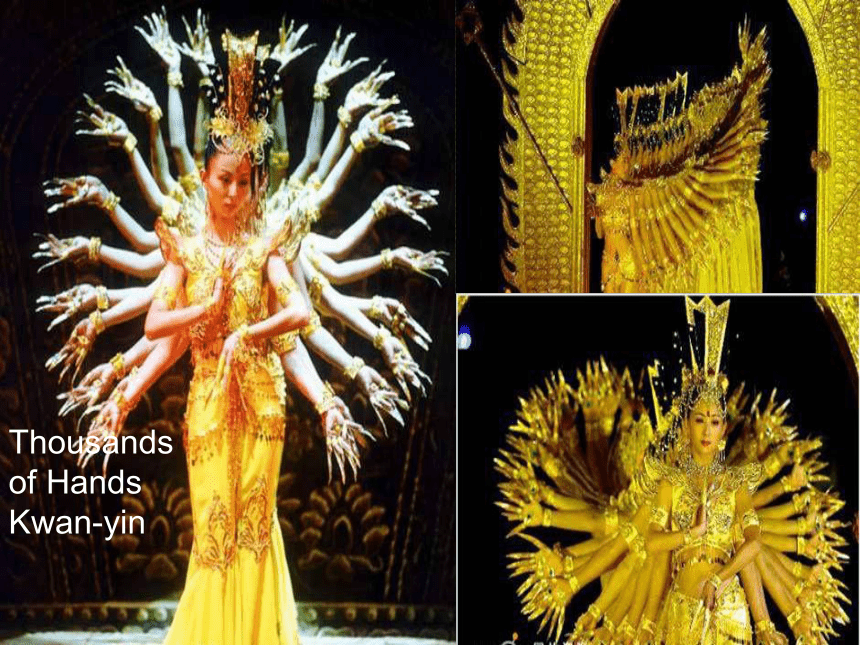

文档简介
(共90张PPT)
Lead-in
What are they trying to tell us?
How are they expressing themselves?
shake one’s hand
(handshake n.)
hug and kiss
nod one’s head
smile
cry
surprise
angry
happy
fear
What are the following facial expressions?
anger
fear
joy
sorrow
contempt
轻视
surprise
disgust
厌恶
Can you guess what is in Liu Xiang ’s mind?
inspired/disappointed
regretful/excited
confident/confused
I’m thinking!
I give up.
Give me a little time!
Please stop!
Nice to meet you!
I’m sorry!
You’re great!
Come and join us!
I’m listening carefully!
It’s important.
OK!
Thousands of Hands Kwan-yin
Tai Lihua 邰丽华
?She got two degrees of bachelors in university.
?She was famous as an artist for her wonderful performance.
?She loves life very much!
邰丽华
雀之灵
A deaf and dumb girl
How does she communicate with others?
By body language.
Unit 4
Body language
Knowledge Goals
Topic
Cultural differences and intercultural communication
Words and Expressions
Learning Goals
Words:
adult, dash, Jordan, misunderstand, misunderstanding, major, defend, defense, approach, cheek, statement, greet, represent, association, dormitory, canteen, flight, curious, curiously, Colombia, spoken, unspoken, Spain, Italy, likely, crossroads, facial, function, ease, truly, false, anger, first, yawn, rank
Expressions:
act out, closely followed by…, introduce…to…, approach sb, step back, at the time as, in the same way, defend against, in general, turn one’s back to, put…at ease, look away from, show respect to, give a hug to
Functional Items
Grammar
1.How to express prohibition and warning?
2. How to express obligation?
Learn to use these sentence types:
Stop! Always stay… Do not…
You must… You should never…
Learn the –ing form as the adverbial.
Ability Goals
Learn what is body language.
Grasp the usual expressions of prohibition, warning and obligation.
Train student’s listening ability of picking out different kinds of body language.
Emotion Goals
Learn the cultural differences avoiding the misunderstanding in the communications.
Important and Difficult point
Important Points
Try to describe gestures, facial expressions and postures and then learn the importance of using body language.
Grasp the new words and expressions in this unit.
Difficult Points
Grasp the skills and methods of using body language when speaking
The correct usage of –ing form as the adverbial.
Warming up
speaking
ringing
writing
typing
Spoken language
Written language
Body language
Ways of communicating
gesturing
Hand signs
To steal
women
promise
Clashing Swords
Money
Laying it on Thick
"Something smells" (Kusai!)
Jan-Ken (Choosing)
What is body language?
Body language is one form of nonverbal communication (非言辞交际) without using words. Eye contact or gaze, facial expression, gesture, and posture (姿势), or the way you stand, are different kinds of body language.
Just like verbal language(言辞), body language is part of culture. It plays an important role in daily communication. So, it is very important to understand and use it correctly. And for a foreign language learner, it is as necessary to learn the body language as to learn the verbal language.
Body language varies from culture to culture.
It means “great” or “good job” in the USA.
It means rude in Nigeria.
It means No.1 in German & Japan.
Do all cultures use the same body movements to express the same meanings?
It means money in Japan.
It means zero in France.
It means rude in Brazil & German.
What does the gesture for OK means
in different countries ?
Same gesture, different interpretations
eye contact
OK
thumbs up
“crazy” gesture
show interest [usually]
be rude or disrespectful
money [Japan]
zero [France]
rudeness [Brazil,Germany]
great / good job[USA]
rude [Nigeria]
NO.1 [Germany,Japan]
crazy [USA]
your phone call[Brazil]
How is body language different from
spoken language ? What do they have
in common?
express our thoughts and opinions
communicate with other people
know direct meaning by words
body language can’t express complex
thoughts, opinions and views
words
body language
express
thoughts
opinions
feelings
listening
self-assured
shouting
Thumbs up!
Thumbs down!
Bite your nails!
Cup your ear!
Make a face!
Keeping your fingers crossed!
Touching your stomach!
Holding up your head!
A smile and a handshake!
let's do
Discuss these questions with your partner first.
1.How many characters were there in the story?
2.Who were they and where did they come from ?
3.What were the ways of greeting ?
Reading
1. Fast Reading, pay attention:
What is the main idea of the passage?
Why do misunderstandings happen?
Part1: ______
____________________________
Part2: ______
____________________________
Part3: ______
____________________________
Part4: ______
____________________________
Para1
Para2-3
Para4-5
Para6
You are sent to Pudong Airport to meet business people.
Examples of learned or cultural “body language”.
Different people have different body languages.
Summary of body language.
Main idea of each part
Task 1 Skimming
Task 2 Scanning
Answer the questions after scanning the text.
How do you understand the sentence“Laughter
is the sun that drives winter from the human
face.” _____?
A. Laughter is the power to drive winter
away and welcome warm spring.
B. Laughter can keep one’s face warm,
especially during freezing winter.
C. Laughter can make people forget their
problems and make them feel happy.
Read the first paragraph and choose the best answer.
C
Read the second paragraph and finish the following chart.
Childhood What happened Things
Family His father ,
leaving the
Family even
. His parents taught him
as soon as he could
speak and as soon
as he could walk.
Teens Charlie became one of the most popular child ______ in England through his .
died
worse off
sing
dance
actors
humour
Read the fifth paragraph :
Question:
What did Charlie Chaplin win in 1972 ?
_____________________________________
Translation:
He is loved and remembered as a great actor who could inspire people with great confidence.
___________________________________________________________
Wang Lin was regarded as a good student who
could help others with his kind heart.
________________________________________________________
人们热爱和怀念这位伟大的 演员,因为他鼓舞人们并增强他们的信心。
A special Oscar
王林被认为是一位好学生,因为他能好心地帮助他人。
Englishmen often stand close to others or touch strangers as soon as they meet.
Most people around the world now greet each other by kissing .
Japanese will bow to others as greeting.
People from Jordan will move very close to you as you introduce yourself to them.
Some body languages in some countries are good while some countries’ body language are bad.
Read paragraph3-6, then decide if the following statements are true (T) or false (F) and correct the error.
T
F
T
F
F
Tony Garcia
Julia Smith
The first mistake
from
from
(Colombia )
(Britain)
He _______ Julia,______ her shoulder and _______ her on the cheek.
She ______ ________ appearing _________ and put up —— —— as if in defense.
touched
kissed
stepped back
surprised
her hands
approached
Find out the two mistakes
The second mistake
George Cook
Akira Nagata
from
(Canada)
He ________ to Mr. Cook and his nose _________ George’s moving hand.
He ________ his hand out to the Japanese student.
bowed
touched
reached
(Japan)
from
Detailed reading
similar body language
1.frowning or turning one’s back to someone
to show anger
2. Making a fist and shaking it
angry and threatening another person
3. nodding the head up and down
to show agreement
similar body language
4. shaking the head
to show disagreement or refusal
5. looking away from a person or yawning
to show no interest to the person
similar body language
6. sitting, looking at and turning towards the person you are talking to
7. rolling your eyes and turn your head away
to show you are interested
to show you do not believe what you hear or you do not like it
2. standing too close to your boss or teacher
1.a hug to your boss or teacher
not acceptable
probably not a good idea to show respect
3. standing at a little distance with open hands
Be willing to listen
other
True or False Statements
Body language is never as important as spoken language.
2. If you are angry at a person, you might turn your back to him or her.
3. You can threaten a person by refusing to speak.
4.If you stand with our arms across your body, you are always protecting yourself from being physically attacked.
F
T
F
F
5. If you sit looking away from a person, or with your back turned, you are saying you are not interested in that person.
6. You should not greet your new boss by giving her or him a hug.
7. Body language is the same all over the world.
8. Most people can understand each other if they try.
T
T
T
F
Read the passage again and try to discuss the following questions in a small group.
How can we know others’ feelings, even if they don’t speak to us?
2. Why should we be careful of our own body language?
3. Why is it important to watch others as well as listen to them?
Listen to a song:
If you’re happy and you know it,
clap your hands;
If you’re happy and you know it,
clap your hands;
If you’re happy and you know it,
then you really want to show it;
If you’re happy and you know it,
clap your hands !
Stamp your feet !
Shout Hooray !
Do all three !
Language Points
1. I saw several young people enter the waiting area looking around curiously.
curious adj.
= eager to learn or know
be curious about sth. 对……好奇
be curious to do sth. 急于……
out of curiosity 出于好奇
如:
As a little girl, she was curious about the origin of human beings.
The tourists were surrounded by the curious children.
2. …closely followed by Julia Smith from Britain.
=…, Julia Smith from Britain closely following.
3. Tony approached Julia, touched her shoulder and kissed her on the cheek.
(1) approach 名词 n. 靠近;临近;接近
going near or nearer to a place
The enemy ran away at our approach.
在我们接近时, 敌人跑了。
verb + sb. in/ on/ by +the 身体部位
We heard the approach of the train.
我们听见火车开过来了。
The approach to the house was a narrow path.
通往这房子的路是一条狭窄的小径。
The best approach to learn a foreign language is the study of the spoken language.
学习外语的最好的途径是学口语。
at the approach of winter 冬季将临的时候
be easy of approach 容易到达; 容易接近
on the approach of death 临死的时候
v. 走近;靠近;接近 come near or nearer to someone or something
You must approach the bird very quietly or it will fly away.
你必须悄悄地走近那只鸟, 否则它会飞走的。
The summer is approaching.
夏季即将来临。
approach sb. about sth. 为某事同某人打交道
approach sb. for information
向某人了解情况
approach sb. with a suggestion 向某人建议
(2) touch vt.
a. 触摸, 接触, 触及, 轻触
I told you not to touch my things.
b. touch sb./ sth. (with sth.)
感动(某人)触动某人(某人的感情)
Her miserable experience touched us all deeply/
touched our hearts with sorrow.
她经历很不幸,我们深受感动 / 我们都很伤心。
c. 接触,联系 n.
get / keep in touch with sb.
与……取得/保持联系
be in/ out of…(with sb.)
与……有/无联系
We’ve been out of touch for years.
4. When we met yesterday, he moved very close to me as I introduced myself.
introduce sb. to sb. 把某人介绍给某人
introduce sth. into… 采用;引进
Please allow me to introduce Mr Smith.
introduction n.
a letter of ~ 介绍信
make a self-introduction 作自我介绍
make ~ to each other 互相介绍
Yao Ming is a person needs no ~.
not … nor 既不……也不……
5. Not all cultures greet each other the same way, nor are they comfortable in the same way with touching or distance between people.
nor / neither 否定副词, 常置于句首, 此时句子要倒装, 即助动词/系动词/情态动词放在主语之前。如:
I don’t like her, nor/neither does Lily.
I am not a nurse, nor/ neither is Lily.
nor = and also not / neither
方式状语
= while they are touching…or being…
6. In the same way that people communicate with spoken language, they also express their feelings using unspoken “language” through keeping physical distance,actions or posture.
(1) that引导的是方式定语从句。
The way that/ in which/或不用关联词。
(2) using引导的是状语, v-ing作状语。
express vt.
(用语言、神色、动作等)表达,表示 (感情、意见)
express sth. ( to sb.)
The guests ~ their thanks before leaving.
你对我的帮助,我感激不尽。
I can’t ~ to you how grateful I am for
your help.
express oneself (清楚地)表达自己的意思
他仍然不能用英语表达自己的意思。
He is still unable to express himself in English.
n. 快车(=express train)
The 8 am express to Beijing.
(邮局, 铁路, 公路等部门提供的) 速递, 速运
send goods by express 特快货运
n. expression 表达,表情
a happy ~ 愉快的神情
7. likely 常用于
sb. /sth. is likely to do sth.
It is likely that…
英语几乎不能说: it’s likely to do sth.
It is likely to rain.
(句子中的it是天气, 并不是形式主语。)
主语既可以是人也可是物
区别: likely, probable, possible
(1)possible 常常用于下列结构:
It is possible for sb. to do sth.
It is possible that 从句
主语不能是人
(2) probable: 常用于it is probable +that 主语不能是人, 几乎不能说it is probable to do sth.
8. general
(1) adj. 普遍的,全面的
A matter of ~ concern/ interest
普遍(公众)关心/感兴趣的事情
Air-conditioner is in general use now.
(2)总的,整体的
general idea of the passage
in general 大体上, 通常, 总的来讲
In general, he is a good guy.
generally speaking
frankly speaking
honestly speaking
Learning about Language
1. Words
misunderstanding major defend defence
approach cheek statement greet
represent association dormitory canteen
flight curious curiously Colombia
spoken unspoken Spain Italy
likely crossroads facial function
ease truly false anger
at the time as in the same way
defend against in general
turn one’s back to put…at ease
look away from show respect to
give a hug to
2. Expressions
Complete the following sentences with some of the words and expressions from the reading.
It is a _______ problem parking your car in Beijing.
Is that Wang LI’s friend from Wuxi? I’d like him to _________ her to me.
As my English vocabulary is very limited, very often I express my meaning with the help of ________________.
In ________, it is better not to kiss somebody you don’t know as you may surprise them.
My leader wants me to ____________ her at the meeting.
major
introduce
body language
general
represent
6. There is a saying that _______ speak louder than
words.
7. Blind people have to understand people’s feelings
through ______ language.
8. Although blind people are not __________
understand your body language, they can still use
body language to _______ their own ideas.
9. When you ___________ blind people, they cannot
tell if they know you until you begin to speak.
actions
spoken
likely to
express
approach
3. Structures
Usage of v-ing form as the adverbial.
当动词的-ing形式作状语时,毫无疑问它只能是现在分词。当现在分词作状语时,分词的逻辑主语必须是句子的主语,分词必须和句中的主语含有逻辑上的主谓关系,否则不能用现在分词作状语。
但要注意其各种形式的变化:
主动形式 被动形式
V-ing being V-ed
having V-ed having been V-ed
一般式
完成式
For example:
Hearing the bell, the students began to enter the classroom.
听见铃声,学生们开始走进教室。(听见和进入两个动作同时发生)
The building being built now is our new library.
现在正在建造的这栋楼房是我们的新图书馆。(being built为现在分词的被动形式,表示动作正在进行之中。)
动词-ing形式可以作状语,修饰动词,在句中表示时间、原因、结果、条件、让步、行为方式或伴随情况等。动词-ing形式作时间、原因、条件、让步状语时多位于句首;作结果、伴随情况状语时常位于句末。
1. 表示时间,相当于一个时间状语从句。
Having made full preparations, we are ready for the examination. (= After we have made full preparations...)
我们已经作好了充分准备,现在可以应考了。
2. 表示原因,相当于一个原因状语从句。
Being poor, he couldn’t afford a TV set.
=Since he was poor….
3. 表示条件,相当于一个条件状语从句。
Working hard, you’ll surely succeed.
=If you work hard….
4.表示行为方式、伴随情况或补充说明,相当于一个并列结构。
The boy sat in front of the farm-house, cutting the branch.
Attention Please
-ing形式作状语时, 它的逻辑主语必须与主句的主语是一致的。
Time permitting, I will pay a visit to the whole city.
(分词的逻辑主语是time , 而句子的主语是I , 两者不构成主谓关系, 所以只能用独立主格结构, 也就是给现在分词补充一个主语。)
She came back from work tired.
= She came back from work and she was tired.
They enter the classroom singing and laughing.
=They enter the classroom and they are singing and laughing.
His nose touched Mr. Cook’s moving hand.
=His nose touched Mr. Cook’s hand which is moving.
1. The boy standing there is reading a book about body language.
The boy ____ __ ________ there is reading a book about body language.
who
is
standing
2. Because he comes from Jordan, he moves close to ask you a question.
_______ _____ Jordan, he moves close to ask you a question.
Coming
from
Rewrite the following sentences.
Using Language
Listening
Listen to the passage and then answer the following questions.
Why do both humans and chimps smile when they are nervous?
Because they hope an enemy will not hurt them.
2. What do both humans and chimps do to make their babies feel safe?
Both humans and chimps hold their babies and hug and kiss them to make them feel safe.
3. What things do both humans and chimps do to make themselves look dangerous and frightening?
Both humans and chimps stand up, and try to make themselves look bigger and more frightening by waving their arms around or standing over the others.
4. How do bigger chimps make the small ones feel safe? Do humans do things like this?
Bigger chimps make the small ones feel safe by touching them or kissing and hugging them. Yes, humans will do things like this if they want to make their children feel safe.
Speaking
Situations:
meeting an old friend in a strange city;
before or after the parents’ meeting;
asking for sth. that your friend forgot to return to you;
in a crowded bus;
at your birthday party;
waiting for a bus or a person;
when you knocked sb off his or her bicycle;
eating sth. very hot;
smelling sth. bad around you in the classroom;
mistaking sb. else for sb. you haven’t seen for a long time.
According to the following situations to rehearse a sketch or make up a dialogue with body language.
Reading and Writing
小刚是北京的一名高中生,他想在2008的北京奥运会上当一名志愿者,最近他参加了一些培训,在培训中他了解到:要当好志愿者,除了要学好外语外,还要了解不同国家的身势语,只有这样才能更好地帮助外国朋友,当好东道主。小刚觉得很有趣,他想把他所了解的知识写信告诉他在外地的笔友――小明。现在请你以小刚的名义写这封信,信要包括下面的要点:
1.不同文化有不同的身势语。
2.法国人热情,见到熟人互相握手,亲吻彼此的脸。
3.中东国家特别是穆斯林国家的男人说话时站得较近,但对妇女只是点头,从不与妇女有身体接触。
4.一般来说,全世界的见面都握手,但日本人更喜欢鞠躬。
5.不同的身势语无所谓好与坏,但了解它们可以增进了解,减少误解,避免交往中的困难。
注意:
1.注意书信的格式(可参考课本P32);
2. 不要逐字逐句翻译要点,可根据需要适当增加。
Summing up
重点单词:
misunderstanding, major, defend, defence, approach, cheek, statement, greet, represent, association, dormitory, canteen, flight, curious, curiously
重点短语:
introduce…to…, approach sb, step back, at the time as, in the same way, defend against, in general, turn one’s back to
语法:
话题:
功能:
Cultural difference and international communication
警告和禁令(prohibition and warning)
义务和责任(obligation)
动词的-ing形式作状语
一、单词拼写 根据读音、词性和词义写出下列单词。
1.__________v. 点头
2.__________adj. 相似的
3.__________vt.避免;消除
4.__________n& v.姿势;做手势
5.__________n.一致;协议
6.__________adj. 地方的;当地的
7.__________n.胸膛
8.__________n.&vt.接近;方法
nod
similar
avoid
gesture
agreement
local
chest
approach
Exercises
10.__________adj. 好奇的
11.__________n.& adj. 成人的
12.__________n.喜剧
13.__________adj.较大的;主要的
14.__________vt.触摸;感动
15.__________n.陌生人
16.__________adj. 口头的
17.__________n. 面颊
18.__________n.行为;动作
19.__________vt. 惩罚
20._____________n. 表达;表情
expression
curious
adult
comedy
major
touch
stranger
spoken
cheek
action
punish
9.___________n.&adj.一般的;普通;将军
general
二、单词运用 根据句子的结构和意义,在空格处填入一个恰当的单词,或者用括号中所给词的适当形式填空。
1.When travelling abroad, I’m always ________ about the customs and lifestyle of ______ people.
2.Our Olympic volunteers, who are ______________ Chinese people, will go all out to do a good job.
3.Is that Tom’s friend from USA? I’d like him to ___________ her to me.
4.At the meeting they discussed three different _____________ to the study of moths.
5.He is so tall that his head nearly __________ the ceiling.
touches
curious
local
representing
introduce
approaches
三、词语派生 用括号中所给词的适当形式填空。
1. Read the following ____________ and decide whether they are true or false. (state)
2. He was a physics __________. That’s to say, he ____________ in physics. (major)
3. The tiger is a ________________ of the cat family. (represent)
4. The wonderful ______________ (introduce) of the book arose my _____________ (curious) to know more about the story.
5. As we all know, __________ speak louder than words. (act)
statements
majored
major
representative
curiosity
introduction
actions
四、词组互译 将下列词组或短语译成中文或英语。
1. 相反_________________________
2. 一般来说_____________________
3. 丢脸_________________________
4. 愿意_________________________
5. 背对,拒绝帮助______________________
6. 面部表情____________________________
7. 伸手________________________________
8.保护……以免受________________
defend…. against
on the contrary
in general
lose face
be willing to (do….)
turn one’s back to
facial expression
reach out
bye bye
Lead-in
What are they trying to tell us?
How are they expressing themselves?
shake one’s hand
(handshake n.)
hug and kiss
nod one’s head
smile
cry
surprise
angry
happy
fear
What are the following facial expressions?
anger
fear
joy
sorrow
contempt
轻视
surprise
disgust
厌恶
Can you guess what is in Liu Xiang ’s mind?
inspired/disappointed
regretful/excited
confident/confused
I’m thinking!
I give up.
Give me a little time!
Please stop!
Nice to meet you!
I’m sorry!
You’re great!
Come and join us!
I’m listening carefully!
It’s important.
OK!
Thousands of Hands Kwan-yin
Tai Lihua 邰丽华
?She got two degrees of bachelors in university.
?She was famous as an artist for her wonderful performance.
?She loves life very much!
邰丽华
雀之灵
A deaf and dumb girl
How does she communicate with others?
By body language.
Unit 4
Body language
Knowledge Goals
Topic
Cultural differences and intercultural communication
Words and Expressions
Learning Goals
Words:
adult, dash, Jordan, misunderstand, misunderstanding, major, defend, defense, approach, cheek, statement, greet, represent, association, dormitory, canteen, flight, curious, curiously, Colombia, spoken, unspoken, Spain, Italy, likely, crossroads, facial, function, ease, truly, false, anger, first, yawn, rank
Expressions:
act out, closely followed by…, introduce…to…, approach sb, step back, at the time as, in the same way, defend against, in general, turn one’s back to, put…at ease, look away from, show respect to, give a hug to
Functional Items
Grammar
1.How to express prohibition and warning?
2. How to express obligation?
Learn to use these sentence types:
Stop! Always stay… Do not…
You must… You should never…
Learn the –ing form as the adverbial.
Ability Goals
Learn what is body language.
Grasp the usual expressions of prohibition, warning and obligation.
Train student’s listening ability of picking out different kinds of body language.
Emotion Goals
Learn the cultural differences avoiding the misunderstanding in the communications.
Important and Difficult point
Important Points
Try to describe gestures, facial expressions and postures and then learn the importance of using body language.
Grasp the new words and expressions in this unit.
Difficult Points
Grasp the skills and methods of using body language when speaking
The correct usage of –ing form as the adverbial.
Warming up
speaking
ringing
writing
typing
Spoken language
Written language
Body language
Ways of communicating
gesturing
Hand signs
To steal
women
promise
Clashing Swords
Money
Laying it on Thick
"Something smells" (Kusai!)
Jan-Ken (Choosing)
What is body language?
Body language is one form of nonverbal communication (非言辞交际) without using words. Eye contact or gaze, facial expression, gesture, and posture (姿势), or the way you stand, are different kinds of body language.
Just like verbal language(言辞), body language is part of culture. It plays an important role in daily communication. So, it is very important to understand and use it correctly. And for a foreign language learner, it is as necessary to learn the body language as to learn the verbal language.
Body language varies from culture to culture.
It means “great” or “good job” in the USA.
It means rude in Nigeria.
It means No.1 in German & Japan.
Do all cultures use the same body movements to express the same meanings?
It means money in Japan.
It means zero in France.
It means rude in Brazil & German.
What does the gesture for OK means
in different countries ?
Same gesture, different interpretations
eye contact
OK
thumbs up
“crazy” gesture
show interest [usually]
be rude or disrespectful
money [Japan]
zero [France]
rudeness [Brazil,Germany]
great / good job[USA]
rude [Nigeria]
NO.1 [Germany,Japan]
crazy [USA]
your phone call[Brazil]
How is body language different from
spoken language ? What do they have
in common?
express our thoughts and opinions
communicate with other people
know direct meaning by words
body language can’t express complex
thoughts, opinions and views
words
body language
express
thoughts
opinions
feelings
listening
self-assured
shouting
Thumbs up!
Thumbs down!
Bite your nails!
Cup your ear!
Make a face!
Keeping your fingers crossed!
Touching your stomach!
Holding up your head!
A smile and a handshake!
let's do
Discuss these questions with your partner first.
1.How many characters were there in the story?
2.Who were they and where did they come from ?
3.What were the ways of greeting ?
Reading
1. Fast Reading, pay attention:
What is the main idea of the passage?
Why do misunderstandings happen?
Part1: ______
____________________________
Part2: ______
____________________________
Part3: ______
____________________________
Part4: ______
____________________________
Para1
Para2-3
Para4-5
Para6
You are sent to Pudong Airport to meet business people.
Examples of learned or cultural “body language”.
Different people have different body languages.
Summary of body language.
Main idea of each part
Task 1 Skimming
Task 2 Scanning
Answer the questions after scanning the text.
How do you understand the sentence“Laughter
is the sun that drives winter from the human
face.” _____?
A. Laughter is the power to drive winter
away and welcome warm spring.
B. Laughter can keep one’s face warm,
especially during freezing winter.
C. Laughter can make people forget their
problems and make them feel happy.
Read the first paragraph and choose the best answer.
C
Read the second paragraph and finish the following chart.
Childhood What happened Things
Family His father ,
leaving the
Family even
. His parents taught him
as soon as he could
speak and as soon
as he could walk.
Teens Charlie became one of the most popular child ______ in England through his .
died
worse off
sing
dance
actors
humour
Read the fifth paragraph :
Question:
What did Charlie Chaplin win in 1972 ?
_____________________________________
Translation:
He is loved and remembered as a great actor who could inspire people with great confidence.
___________________________________________________________
Wang Lin was regarded as a good student who
could help others with his kind heart.
________________________________________________________
人们热爱和怀念这位伟大的 演员,因为他鼓舞人们并增强他们的信心。
A special Oscar
王林被认为是一位好学生,因为他能好心地帮助他人。
Englishmen often stand close to others or touch strangers as soon as they meet.
Most people around the world now greet each other by kissing .
Japanese will bow to others as greeting.
People from Jordan will move very close to you as you introduce yourself to them.
Some body languages in some countries are good while some countries’ body language are bad.
Read paragraph3-6, then decide if the following statements are true (T) or false (F) and correct the error.
T
F
T
F
F
Tony Garcia
Julia Smith
The first mistake
from
from
(Colombia )
(Britain)
He _______ Julia,______ her shoulder and _______ her on the cheek.
She ______ ________ appearing _________ and put up —— —— as if in defense.
touched
kissed
stepped back
surprised
her hands
approached
Find out the two mistakes
The second mistake
George Cook
Akira Nagata
from
(Canada)
He ________ to Mr. Cook and his nose _________ George’s moving hand.
He ________ his hand out to the Japanese student.
bowed
touched
reached
(Japan)
from
Detailed reading
similar body language
1.frowning or turning one’s back to someone
to show anger
2. Making a fist and shaking it
angry and threatening another person
3. nodding the head up and down
to show agreement
similar body language
4. shaking the head
to show disagreement or refusal
5. looking away from a person or yawning
to show no interest to the person
similar body language
6. sitting, looking at and turning towards the person you are talking to
7. rolling your eyes and turn your head away
to show you are interested
to show you do not believe what you hear or you do not like it
2. standing too close to your boss or teacher
1.a hug to your boss or teacher
not acceptable
probably not a good idea to show respect
3. standing at a little distance with open hands
Be willing to listen
other
True or False Statements
Body language is never as important as spoken language.
2. If you are angry at a person, you might turn your back to him or her.
3. You can threaten a person by refusing to speak.
4.If you stand with our arms across your body, you are always protecting yourself from being physically attacked.
F
T
F
F
5. If you sit looking away from a person, or with your back turned, you are saying you are not interested in that person.
6. You should not greet your new boss by giving her or him a hug.
7. Body language is the same all over the world.
8. Most people can understand each other if they try.
T
T
T
F
Read the passage again and try to discuss the following questions in a small group.
How can we know others’ feelings, even if they don’t speak to us?
2. Why should we be careful of our own body language?
3. Why is it important to watch others as well as listen to them?
Listen to a song:
If you’re happy and you know it,
clap your hands;
If you’re happy and you know it,
clap your hands;
If you’re happy and you know it,
then you really want to show it;
If you’re happy and you know it,
clap your hands !
Stamp your feet !
Shout Hooray !
Do all three !
Language Points
1. I saw several young people enter the waiting area looking around curiously.
curious adj.
= eager to learn or know
be curious about sth. 对……好奇
be curious to do sth. 急于……
out of curiosity 出于好奇
如:
As a little girl, she was curious about the origin of human beings.
The tourists were surrounded by the curious children.
2. …closely followed by Julia Smith from Britain.
=…, Julia Smith from Britain closely following.
3. Tony approached Julia, touched her shoulder and kissed her on the cheek.
(1) approach 名词 n. 靠近;临近;接近
going near or nearer to a place
The enemy ran away at our approach.
在我们接近时, 敌人跑了。
verb + sb. in/ on/ by +the 身体部位
We heard the approach of the train.
我们听见火车开过来了。
The approach to the house was a narrow path.
通往这房子的路是一条狭窄的小径。
The best approach to learn a foreign language is the study of the spoken language.
学习外语的最好的途径是学口语。
at the approach of winter 冬季将临的时候
be easy of approach 容易到达; 容易接近
on the approach of death 临死的时候
v. 走近;靠近;接近 come near or nearer to someone or something
You must approach the bird very quietly or it will fly away.
你必须悄悄地走近那只鸟, 否则它会飞走的。
The summer is approaching.
夏季即将来临。
approach sb. about sth. 为某事同某人打交道
approach sb. for information
向某人了解情况
approach sb. with a suggestion 向某人建议
(2) touch vt.
a. 触摸, 接触, 触及, 轻触
I told you not to touch my things.
b. touch sb./ sth. (with sth.)
感动(某人)触动某人(某人的感情)
Her miserable experience touched us all deeply/
touched our hearts with sorrow.
她经历很不幸,我们深受感动 / 我们都很伤心。
c. 接触,联系 n.
get / keep in touch with sb.
与……取得/保持联系
be in/ out of…(with sb.)
与……有/无联系
We’ve been out of touch for years.
4. When we met yesterday, he moved very close to me as I introduced myself.
introduce sb. to sb. 把某人介绍给某人
introduce sth. into… 采用;引进
Please allow me to introduce Mr Smith.
introduction n.
a letter of ~ 介绍信
make a self-introduction 作自我介绍
make ~ to each other 互相介绍
Yao Ming is a person needs no ~.
not … nor 既不……也不……
5. Not all cultures greet each other the same way, nor are they comfortable in the same way with touching or distance between people.
nor / neither 否定副词, 常置于句首, 此时句子要倒装, 即助动词/系动词/情态动词放在主语之前。如:
I don’t like her, nor/neither does Lily.
I am not a nurse, nor/ neither is Lily.
nor = and also not / neither
方式状语
= while they are touching…or being…
6. In the same way that people communicate with spoken language, they also express their feelings using unspoken “language” through keeping physical distance,actions or posture.
(1) that引导的是方式定语从句。
The way that/ in which/或不用关联词。
(2) using引导的是状语, v-ing作状语。
express vt.
(用语言、神色、动作等)表达,表示 (感情、意见)
express sth. ( to sb.)
The guests ~ their thanks before leaving.
你对我的帮助,我感激不尽。
I can’t ~ to you how grateful I am for
your help.
express oneself (清楚地)表达自己的意思
他仍然不能用英语表达自己的意思。
He is still unable to express himself in English.
n. 快车(=express train)
The 8 am express to Beijing.
(邮局, 铁路, 公路等部门提供的) 速递, 速运
send goods by express 特快货运
n. expression 表达,表情
a happy ~ 愉快的神情
7. likely 常用于
sb. /sth. is likely to do sth.
It is likely that…
英语几乎不能说: it’s likely to do sth.
It is likely to rain.
(句子中的it是天气, 并不是形式主语。)
主语既可以是人也可是物
区别: likely, probable, possible
(1)possible 常常用于下列结构:
It is possible for sb. to do sth.
It is possible that 从句
主语不能是人
(2) probable: 常用于it is probable +that 主语不能是人, 几乎不能说it is probable to do sth.
8. general
(1) adj. 普遍的,全面的
A matter of ~ concern/ interest
普遍(公众)关心/感兴趣的事情
Air-conditioner is in general use now.
(2)总的,整体的
general idea of the passage
in general 大体上, 通常, 总的来讲
In general, he is a good guy.
generally speaking
frankly speaking
honestly speaking
Learning about Language
1. Words
misunderstanding major defend defence
approach cheek statement greet
represent association dormitory canteen
flight curious curiously Colombia
spoken unspoken Spain Italy
likely crossroads facial function
ease truly false anger
at the time as in the same way
defend against in general
turn one’s back to put…at ease
look away from show respect to
give a hug to
2. Expressions
Complete the following sentences with some of the words and expressions from the reading.
It is a _______ problem parking your car in Beijing.
Is that Wang LI’s friend from Wuxi? I’d like him to _________ her to me.
As my English vocabulary is very limited, very often I express my meaning with the help of ________________.
In ________, it is better not to kiss somebody you don’t know as you may surprise them.
My leader wants me to ____________ her at the meeting.
major
introduce
body language
general
represent
6. There is a saying that _______ speak louder than
words.
7. Blind people have to understand people’s feelings
through ______ language.
8. Although blind people are not __________
understand your body language, they can still use
body language to _______ their own ideas.
9. When you ___________ blind people, they cannot
tell if they know you until you begin to speak.
actions
spoken
likely to
express
approach
3. Structures
Usage of v-ing form as the adverbial.
当动词的-ing形式作状语时,毫无疑问它只能是现在分词。当现在分词作状语时,分词的逻辑主语必须是句子的主语,分词必须和句中的主语含有逻辑上的主谓关系,否则不能用现在分词作状语。
但要注意其各种形式的变化:
主动形式 被动形式
V-ing being V-ed
having V-ed having been V-ed
一般式
完成式
For example:
Hearing the bell, the students began to enter the classroom.
听见铃声,学生们开始走进教室。(听见和进入两个动作同时发生)
The building being built now is our new library.
现在正在建造的这栋楼房是我们的新图书馆。(being built为现在分词的被动形式,表示动作正在进行之中。)
动词-ing形式可以作状语,修饰动词,在句中表示时间、原因、结果、条件、让步、行为方式或伴随情况等。动词-ing形式作时间、原因、条件、让步状语时多位于句首;作结果、伴随情况状语时常位于句末。
1. 表示时间,相当于一个时间状语从句。
Having made full preparations, we are ready for the examination. (= After we have made full preparations...)
我们已经作好了充分准备,现在可以应考了。
2. 表示原因,相当于一个原因状语从句。
Being poor, he couldn’t afford a TV set.
=Since he was poor….
3. 表示条件,相当于一个条件状语从句。
Working hard, you’ll surely succeed.
=If you work hard….
4.表示行为方式、伴随情况或补充说明,相当于一个并列结构。
The boy sat in front of the farm-house, cutting the branch.
Attention Please
-ing形式作状语时, 它的逻辑主语必须与主句的主语是一致的。
Time permitting, I will pay a visit to the whole city.
(分词的逻辑主语是time , 而句子的主语是I , 两者不构成主谓关系, 所以只能用独立主格结构, 也就是给现在分词补充一个主语。)
She came back from work tired.
= She came back from work and she was tired.
They enter the classroom singing and laughing.
=They enter the classroom and they are singing and laughing.
His nose touched Mr. Cook’s moving hand.
=His nose touched Mr. Cook’s hand which is moving.
1. The boy standing there is reading a book about body language.
The boy ____ __ ________ there is reading a book about body language.
who
is
standing
2. Because he comes from Jordan, he moves close to ask you a question.
_______ _____ Jordan, he moves close to ask you a question.
Coming
from
Rewrite the following sentences.
Using Language
Listening
Listen to the passage and then answer the following questions.
Why do both humans and chimps smile when they are nervous?
Because they hope an enemy will not hurt them.
2. What do both humans and chimps do to make their babies feel safe?
Both humans and chimps hold their babies and hug and kiss them to make them feel safe.
3. What things do both humans and chimps do to make themselves look dangerous and frightening?
Both humans and chimps stand up, and try to make themselves look bigger and more frightening by waving their arms around or standing over the others.
4. How do bigger chimps make the small ones feel safe? Do humans do things like this?
Bigger chimps make the small ones feel safe by touching them or kissing and hugging them. Yes, humans will do things like this if they want to make their children feel safe.
Speaking
Situations:
meeting an old friend in a strange city;
before or after the parents’ meeting;
asking for sth. that your friend forgot to return to you;
in a crowded bus;
at your birthday party;
waiting for a bus or a person;
when you knocked sb off his or her bicycle;
eating sth. very hot;
smelling sth. bad around you in the classroom;
mistaking sb. else for sb. you haven’t seen for a long time.
According to the following situations to rehearse a sketch or make up a dialogue with body language.
Reading and Writing
小刚是北京的一名高中生,他想在2008的北京奥运会上当一名志愿者,最近他参加了一些培训,在培训中他了解到:要当好志愿者,除了要学好外语外,还要了解不同国家的身势语,只有这样才能更好地帮助外国朋友,当好东道主。小刚觉得很有趣,他想把他所了解的知识写信告诉他在外地的笔友――小明。现在请你以小刚的名义写这封信,信要包括下面的要点:
1.不同文化有不同的身势语。
2.法国人热情,见到熟人互相握手,亲吻彼此的脸。
3.中东国家特别是穆斯林国家的男人说话时站得较近,但对妇女只是点头,从不与妇女有身体接触。
4.一般来说,全世界的见面都握手,但日本人更喜欢鞠躬。
5.不同的身势语无所谓好与坏,但了解它们可以增进了解,减少误解,避免交往中的困难。
注意:
1.注意书信的格式(可参考课本P32);
2. 不要逐字逐句翻译要点,可根据需要适当增加。
Summing up
重点单词:
misunderstanding, major, defend, defence, approach, cheek, statement, greet, represent, association, dormitory, canteen, flight, curious, curiously
重点短语:
introduce…to…, approach sb, step back, at the time as, in the same way, defend against, in general, turn one’s back to
语法:
话题:
功能:
Cultural difference and international communication
警告和禁令(prohibition and warning)
义务和责任(obligation)
动词的-ing形式作状语
一、单词拼写 根据读音、词性和词义写出下列单词。
1.__________v. 点头
2.__________adj. 相似的
3.__________vt.避免;消除
4.__________n& v.姿势;做手势
5.__________n.一致;协议
6.__________adj. 地方的;当地的
7.__________n.胸膛
8.__________n.&vt.接近;方法
nod
similar
avoid
gesture
agreement
local
chest
approach
Exercises
10.__________adj. 好奇的
11.__________n.& adj. 成人的
12.__________n.喜剧
13.__________adj.较大的;主要的
14.__________vt.触摸;感动
15.__________n.陌生人
16.__________adj. 口头的
17.__________n. 面颊
18.__________n.行为;动作
19.__________vt. 惩罚
20._____________n. 表达;表情
expression
curious
adult
comedy
major
touch
stranger
spoken
cheek
action
punish
9.___________n.&adj.一般的;普通;将军
general
二、单词运用 根据句子的结构和意义,在空格处填入一个恰当的单词,或者用括号中所给词的适当形式填空。
1.When travelling abroad, I’m always ________ about the customs and lifestyle of ______ people.
2.Our Olympic volunteers, who are ______________ Chinese people, will go all out to do a good job.
3.Is that Tom’s friend from USA? I’d like him to ___________ her to me.
4.At the meeting they discussed three different _____________ to the study of moths.
5.He is so tall that his head nearly __________ the ceiling.
touches
curious
local
representing
introduce
approaches
三、词语派生 用括号中所给词的适当形式填空。
1. Read the following ____________ and decide whether they are true or false. (state)
2. He was a physics __________. That’s to say, he ____________ in physics. (major)
3. The tiger is a ________________ of the cat family. (represent)
4. The wonderful ______________ (introduce) of the book arose my _____________ (curious) to know more about the story.
5. As we all know, __________ speak louder than words. (act)
statements
majored
major
representative
curiosity
introduction
actions
四、词组互译 将下列词组或短语译成中文或英语。
1. 相反_________________________
2. 一般来说_____________________
3. 丢脸_________________________
4. 愿意_________________________
5. 背对,拒绝帮助______________________
6. 面部表情____________________________
7. 伸手________________________________
8.保护……以免受________________
defend…. against
on the contrary
in general
lose face
be willing to (do….)
turn one’s back to
facial expression
reach out
bye bye
同课章节目录
